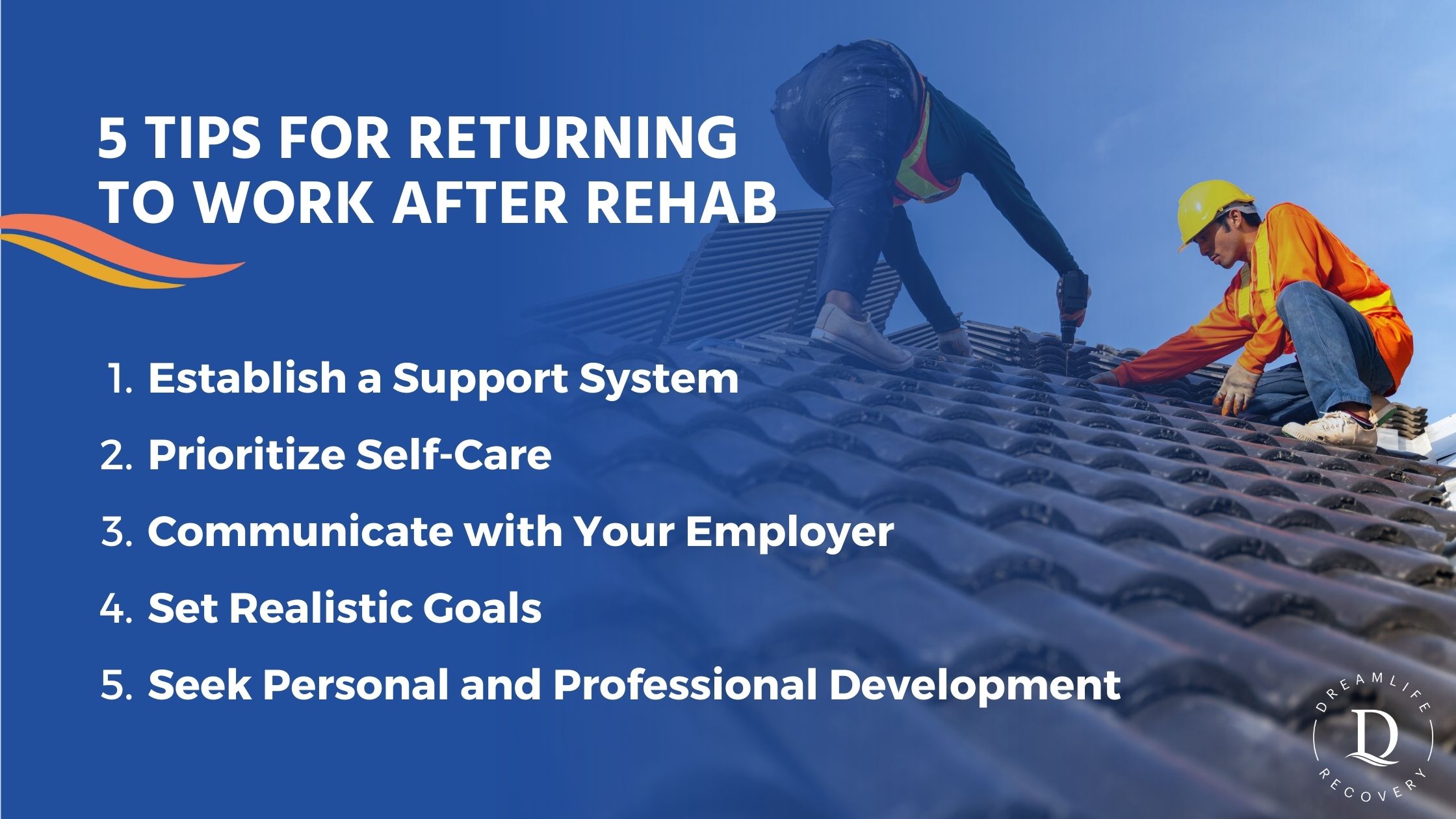5 Tips for Returning to Work After Treatment

Written By
DreamLife RecoveryEmbarking on a journey to treatment and recovering from addiction is a monumental feat. However, the path doesn’t end there. Often, the transition back to the workplace can be just as challenging, if not more so, than the recovery journey itself.
This period is critical for maintaining sobriety, reintegrating into professional life, and ensuring that all the progress made during treatment is not only preserved but enhanced.
If you or someone you know has recently completed a treatment program, facing the transition back to work can be overwhelming. Whether you’re concerned about managing stress, maintaining your sobriety, or even communicating your rehabilitation journey with your employer, these five tips are designed to help you navigate this crucial chapter with confidence and success.

1. Establish a Support System
When it comes to returning to work after treatment, having a solid support system can make all the difference.
Family and Friends:
Your loved ones can provide a strong foundation of support. Openly communicate with them about your concerns and victories. The acceptance, encouragement, and love they offer can be vital in the workplace reintegration process.
Support Groups:
Attending support groups like Alcoholics Anonymous or Narcotics Anonymous can offer a sense of community and understanding that you might not find elsewhere.
These groups are filled with individuals who have experienced similar situations and can provide unique perspectives and support.
Aftercare Programs:
Reputable aftercare programs, such as the one offered at DreamLife Recovery, focus on seamless transitions from treatment programs back into daily life. Accessing these services ensures you have ongoing support tailored to your unique needs.
Utilize Professional Help:
A trained counselor or therapist can support you as you process emotions and stress related to work. They can offer strategies to manage triggers and provide a safe space for discussing workplace challenges.
2. Prioritize Self-Care
Returning to work after treatment can be a time of high stress and anxiety, making it crucial to prioritize self-care.
Physical Health:
Consistent exercise and a balanced diet can improve mood, energy levels, and overall health. Consider incorporating regular physical activities such as running, yoga, or swimming into your daily routine.
Mental Well-being:
Mindfulness practices, like meditation and deep breathing, can help manage stress and reduce the risk of relapse. Apps and online resources can guide you through these practices.
Sleep Hygiene:
Develop a regular sleep schedule and an environment conducive to rest. Adequate sleep is essential for cognitive function and emotional regulation.
Healthy Habits:
Avoiding substances, even those commonly used like nicotine and caffeine, can prevent a resumption of addictive behaviors. Adopting a mindfulness practice can be particularly helpful.
3. Communicate with Your Employer
Honesty and open communication with your employer are vital in ensuring a successful reentry into the workforce.
De-stigmatize Addiction:
Be prepared to have a candid discussion about your experience. This can help correct misunderstandings your employer may have about addiction and rehabilitation.
Request Accommodations When Necessary:
If you need a more gradual workload, flexible hours, or support in any form, don’t hesitate to ask. Your employer wants you to succeed, and accommodations can be a beneficial tool during this phase.
Explain the Benefits:
Sharing the positive impacts of your experience, such as increased energy, higher productivity, and sharper focus, can reassure your employer that your commitment to sobriety aligns with your work goals.
4. Set Realistic Goals
Setting small, achievable goals can provide a sense of accomplishment and motivate you to continue your journey toward success.
Start Small:
Begin with tasks that are manageable and gradually increase your workload. This incremental approach can prevent you from feeling overwhelmed and reduce the risk of relapse due to stress.
Celebrate Progress:
Take note of your accomplishments, no matter how small. Each milestone is a victory and a reason to celebrate. Reflect on these triumphs to keep you motivated and focused on your long-term goals.
Evaluate and Adjust:
Be willing to adapt your goals and strategies as needed. The workplace is dynamic, and so are you. What works one week might not be as effective the next, and that’s okay.
5. Seek Personal and Professional Development
Continuing your personal and professional growth is an essential part of maintaining sobriety and finding fulfillment in life and work post-rehabilitation.
Continued treatment Programs:
Find a reputable treatment program with an aftercare program that encompasses personal and professional development. DreamLife Recovery offers aftercare services designed to support you in your day-to-day life, professional development, and continued growth.
Education and Training:
Consider taking classes or attending workshops that align with your career goals. Continuous learning not only enhances your skills but can also be a fulfilling and empowering experience as you navigate your new life in recovery.
Volunteering and Networking:
Engage in volunteer opportunities to connect with others and build your professional network. Giving back can provide a sense of purpose and community, valuable elements in a successful recovery.
Seek Mentorship:
Find a mentor within your workplace or industry who can provide guidance and support. A mentor’s insights and experience can be invaluable as you progress professionally.
Why Are These Skills Important?
Returning to work after treatment is a transitional phase that requires patience, understanding, and a commitment to both professional and personal growth. These tips, in conjunction with the support offered through reputable aftercare programs, can assist in crafting a meaningful and productive life post-rehabilitation.
Remember, this is just the beginning of a new chapter. Embrace it with a sense of renewal and a commitment to your well-being, and you will pave the way for a bright and successful future.
Get Aftercare for Personal and Professional Development Today
At DreamLife Recovery, we offer a comprehensive aftercare program with a dynamic approach to helping our clients not only during treatment and recovery but also as they reintegrate back into society to commence their daily duties.
Besides helping you recover, we will also guide you as you rediscover yourself both professionally and at a personal level. Our experts will walk you through how to prepare for an interview, how to build your resume, how to manage stress, how to strike a work-life balance, career options, setting boundaries, budgeting strategies, and more.
To enroll in our Aftercare program, call us at (855) 384-5808 or fill out this contact form to book an appointment for consultation.







